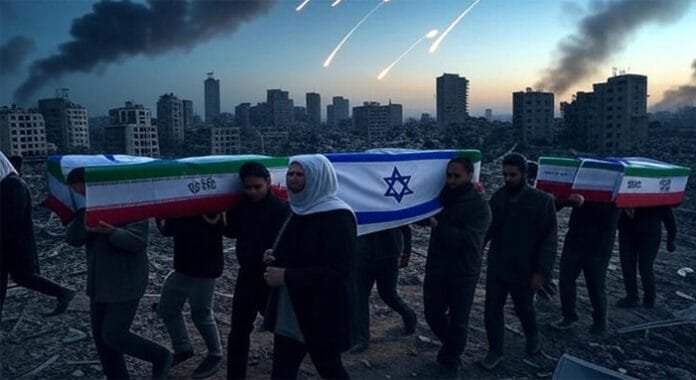INVC NEWS
Middle East – : The Middle East is reeling under the relentless impact of a high-stakes conflict as Iran and Israel’s war enters its ninth consecutive day, leaving behind a trail of rubble, grief, and growing geopolitical uncertainty. What began as cross-border tensions has now morphed into a full-scale military escalation, with missile attacks leveling buildings, and the civilian population bearing the brunt of a war that shows no signs of retreat.
Mass Casualties, Massive Damage: War Wreaks Havoc
More than 681 people have been killed—24 in Israel and a staggering 657 in Iran, according to human rights monitors. Over 2,900 individuals are reported injured, many critically, as airstrikes and retaliatory missile fire pummel densely populated zones and military installations. Iranian ballistic missiles have reportedly destroyed Israel’s Ministry of Interior headquarters, marking one of the war’s most high-profile attacks to date. Meanwhile, Israeli Defense Forces (IDF) continue launching counter-assaults targeting Iranian nuclear facilities and intelligence command centers.
Across both nations, cities have transformed into battlefields. In Tehran, coffins wrapped in national flags are paraded through streets while mourners raise slogans against Israel. In Tel Aviv, tears flow as citizens bury their dead—innocents caught in the crossfire. The overwhelming consensus from the masses: “War solves nothing.”
Isfahan Nuclear Site Under Attack: Strategic Strikes Intensify
In a bold and highly calculated maneuver, Israel targeted the Isfahan nuclear facility early Saturday, triggering fears of nuclear fallout and regional destabilization. This airstrike coincided with a series of precision attacks on Iran’s intelligence infrastructure, which reportedly killed 15 members of Iran’s Revolutionary Guard Corps (IRGC), including three top-ranking intelligence commanders.
Most notable among the dead is Bahnām Shahriyari, commander of the IRGC’s Quds Force Unit 190, responsible for weapons transfers across the Middle East. The IDF confirmed that Shahriyari was eliminated in a targeted airstrike in western Iran, describing it as a “critical blow” to Iran’s logistical war network.
Iranian Counteroffensives: Direct Hits and Covert Ops
Iran’s response was no less fierce. Missiles rained down on Tel Aviv, Haifa, and Ashdod, causing significant infrastructural destruction. The Iranian military claims it has successfully struck multiple Israeli defense compounds. On the intelligence front, Iran has arrested 22 individuals in Qom province on charges of spying for Israel, signaling an intense domestic crackdown on suspected Israeli intelligence networks operating within Iran.
Furthermore, in a dramatic escalation, Israeli Defense Minister Yoav Gallant confirmed the killing of Saeed Izadi, the commander in charge of Palestinian relations within the Quds Force. Izadi had reportedly overseen financial support for Hamas operations, including the October 7, 2023 attack that triggered widespread unrest across the region.
Cities in Ruins: Civilian Exodus Amid Relentless Shelling
The cities of Qom, Isfahan, and Tehran now resemble ghost towns as thousands flee the daily threat of missile strikes. In Israel, air raid sirens wail across Jerusalem and Tel Aviv, driving people into bunkers and safe rooms. Both nations are gripped by fear, uncertainty, and despair as warplanes roar overhead and firestorms blanket the skies.
Meanwhile, funeral processions across both countries offer heart-wrenching visuals—mothers clutching coffins, children sobbing, and streets echoing with cries of anguish. There is a singular sentiment uniting Iranians and Israelis alike: the urgent need to end this carnage.
Global Reactions: Washington, Moscow, and Delhi Weigh In
The reverberations of this escalating war are being felt far beyond the region. Former U.S. President Donald Trump bluntly stated, “Israel is currently winning,” adding that he would not advise halting the campaign given the current momentum. While his comments drew both praise and criticism, they reflect a broader uncertainty in the international community on how to respond.
Russian President Vladimir Putin, meanwhile, has issued a dire warning about a potential World War III, pointing to the Israeli attacks near Iranian nuclear plants, where Russian engineers are constructing two reactors. Putin emphasized the urgent need for diplomacy, stating that “the path to peace is narrowing.”
India’s Strategic Dilemma: Torn Between Allies
India is watching the situation with increasing concern. The country shares strong defense ties with Israel, having acquired Barak-8 missiles, surveillance drones, and loitering munitions crucial for its national defense. Simultaneously, India depends heavily on Iranian crude oil and has invested strategically in the Chabahar Port, a vital link to Afghanistan and Central Asia that bypasses Pakistan.
New Delhi issued an official statement urging “immediate de-escalation and dialogue.” However, behind the scenes, strategic planners are preparing for worst-case scenarios, including disrupted oil supplies, delayed trade routes, and rising energy costs that could hit the Indian economy hard.
Regional Fallout: Escalation Could Trigger Broader War
This war is no longer a bilateral crisis. With Iran’s support for proxy militias in Syria, Iraq, and Lebanon, and Israel’s deep ties with the West, the potential for a broader regional or even global war looms ominously. Experts fear that continued Israeli strikes on nuclear infrastructure could provoke Iran to respond with unconventional weapons or open up secondary fronts via Hezbollah or Shia militias.
Additionally, Saudi Arabia, Egypt, and Turkey are now on high alert, monitoring the situation closely. As missiles fly and alliances tighten, the Middle East teeters dangerously on the edge of irreversible chaos.
Economic Consequences: Markets Rattle, Oil Prices Surge
As tensions escalate, the global economy is bracing for a shockwave. Oil prices have already surged past $100 per barrel, disrupting energy markets and threatening inflation spikes worldwide. The Suez Canal trade volume is declining, and insurance premiums for cargo through the Strait of Hormuz are skyrocketing. Financial analysts warn that if the war continues beyond two weeks, the global supply chain may face unprecedented pressure.
Conclusion: No End in Sight, Only Growing Despair
As we document this unfolding tragedy, one truth remains evident: neither Tehran’s alleys nor Tel Aviv’s streets are winning. The war between Iran and Israel is not merely a clash of nations—it is a war on humanity, dreams, and hope itself. With every explosion, every funeral, and every news alert, the region inches closer to a catastrophe that could engulf the entire world.
Diplomatic channels must open. Civilians must be protected. And the war, somehow, must end—before the death toll becomes too high to count.
















